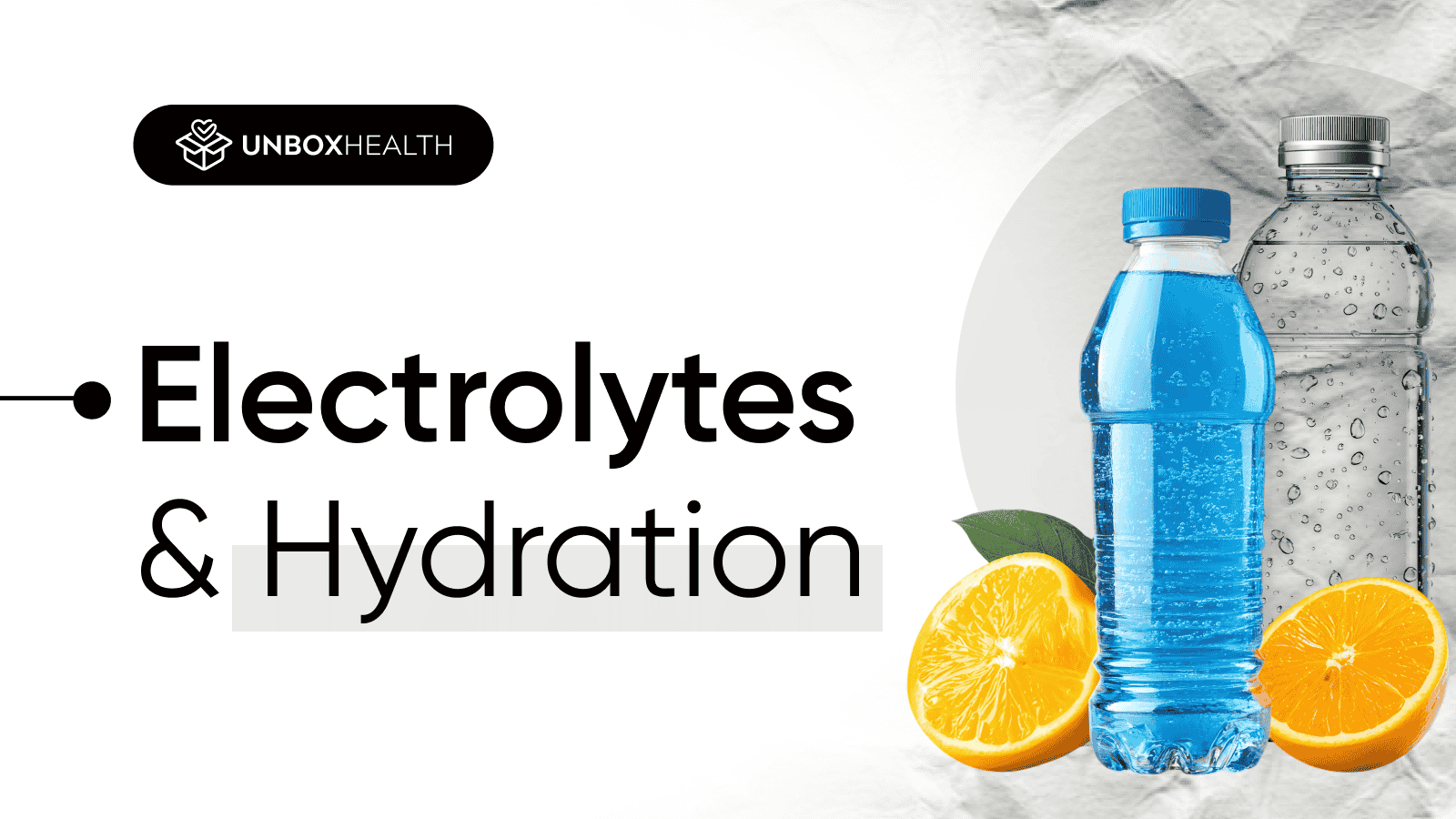When we think of hydration, we often think of water. But water alone is not enough. Your body also needs electrolytes, the essential minerals that power every heartbeat, muscle contraction, and nerve signal. Water alone cannot sustain the body’s complex systems.
What Are Electrolytes?
Electrolytes are minerals that carry an electric charge, found in blood, sweat, and urine. The key players include:
- Sodium – Maintains fluid balance and blood pressure [1].
- Potassium – Supports heart and muscle function [1].
- Chloride – Works with sodium to aid hydration and digestion [1].
These minerals regulate nerve impulses, muscle contractions, and pH balance. Without them, your body’s systems cannot function properly.
Why Do You Need Electrolytes?
Everyday activities such as walking, talking, sweating, and even breathing involve the exchange of fluids and electrolytes [2]. You lose electrolytes through:
- Sweat (especially during exercise or in hot weather)
- Urine and stool (more during illness)
- Lifestyle habits (coffee and alcohol can increase losses)
If you are on a low-carb diet, fasting, or taking diuretics, your electrolyte needs may be higher [3]. Warning signs of imbalance can include muscle cramps, dizziness, fatigue, irregular heartbeat, and confusion [2].
Sodium: Not the Enemy
While excess sodium from processed foods can raise health risks, appropriate sodium intake from clean sources is essential for blood volume regulation, nerve function, and preventing dehydration [4]. The key is balance, avoid excess from processed foods but ensure adequate intake from quality sources.
Potassium: The Heart-Healthy Hero
Potassium works inside cells to counterbalance sodium, aiding muscle contraction and supporting heart health [1]. Foods like bananas, spinach, potatoes, and coconut water are rich in potassium. If your diet lacks fresh produce, you may need to increase intake. Pairing potassium-rich foods with proper hydration improves effectiveness.
Chloride: The Hydration Partner
Chloride works closely with sodium to maintain fluid balance, support digestion through stomach acid (HCl), and help regulate pH levels in the body [1]. Natural sources include sea salt, tomatoes, olives, and leafy greens. Adequate chloride intake ensures hydration strategies are effective and balanced.
Clean Electrolytes vs Sugary Sports Drinks
Most commercial sports drinks are high in sugar with minimal minerals [5]. At Unbox Health, we focus on:
- Balanced sodium, potassium, and chloride ratios backed by science
- Convenient powders, tablets, or sachets for on-the-go hydration
- We lab test electrolytes primarily for key minerals such as sodium, calcium, potassium, chloride, and magnesium, along with added vitamins like vitamin C, to ensure product label accuracy and verify standards for electrolyte claims.
When to Supplement
While a balanced diet can meet most needs, electrolyte supplementation is useful:
- After intense exercise or sweating
- During illness with fluid loss
- On low-carb or fasting diets
- In hot weather or during travel
- For women during PMS or menstruation [1, 3, 5]
Smart, targeted mixes can replenish minerals quickly and effectively.
The Booming Electrolyte Market
The electrolyte drink market is projected to reach $34.2 billion by 2025 [6]. Growth is driven by increased awareness of cellular hydration, energy, and wellness. Trends include clean-label and plant-based formulas, sugar-free and keto-friendly products, and sustainable sourcing.
Unbox Health: Science-Based Ratings You Can Trust
Unbox Health is India’s first unbiased ratings platform for packaged foods and supplements based solely on third-party lab testing. Products are sourced from the market and tested in NABL-accredited and FSSAI-certified laboratories for label accuracy, toxin limits, and nutritional content. The ratings, graded from A+ to D, are publicly available along with full lab reports.
In our Electrolytes category, every product listed has been tested and rated using this transparent, science-backed method. This allows you to choose hydration solutions with complete confidence.
Check out unbiased lab-tested ratings of “Electrolytes Supplements” on Unbox Health along with their detailed lab reports.
About Unbox Health
Unbox Health: India’s First Ratings Platform for Packaged Foods and Health Supplement Tired of biased reviews and never-ending claims? At Unbox Health, every product is tested at multiple premium FSSAI-approved NABL-accredited international labs – 100% independently, transparently, and without any brand involvement.
- 100% Transparency: All lab reports are publicly published.
- Zero Hidden Agendas: Products are market-bought with no brand involvement.
- Accurate Testing: Samples tested at up to 3 premium international labs
- Actionable Ratings: Based on Label Accuracy, Toxicity & Nutritional Profile.
Head over to Unbox Health and let the data guide your consumption choices.
References
- Narins, R. G., & Emmett, M. (2023). Electrolytes. In StatPearls [Internet]. StatPearls Publishing. https://www.ncbi.nlm.nih.gov/books/NBK541123/
- Kenney, W. L., & Chiu, P. (2001). Influence of age on thirst and fluid intake. Medicine & Science in Sports & Exercise, 33(9), 1524–1532. https://doi.org/10.1097/00005768-200109000-00016
- Cahill, G. F. Jr. (2006). Fuel metabolism in starvation. Annual Review of Nutrition, 26, 1–22. https://doi.org/10.1146/annurev.nutr.26.061505.111258
- World Health Organization. (2012). Guideline: Sodium intake for adults and children. WHO Press. https://apps.who.int/iris/handle/10665/77985
- Coombes, J. S., & Hamilton, K. L. (2000). The effectiveness of commercially available sports drinks. Sports Medicine, 29(3), 181–209. https://doi.org/10.2165/00007256-200029030-00004
- MarketsandMarkets. (2020). Electrolyte drinks market by type, application, and region – Global forecast to 2025. https://www.marketsandmarkets.com/Market-Reports/electrolyte-drinks-market-232125873.html
